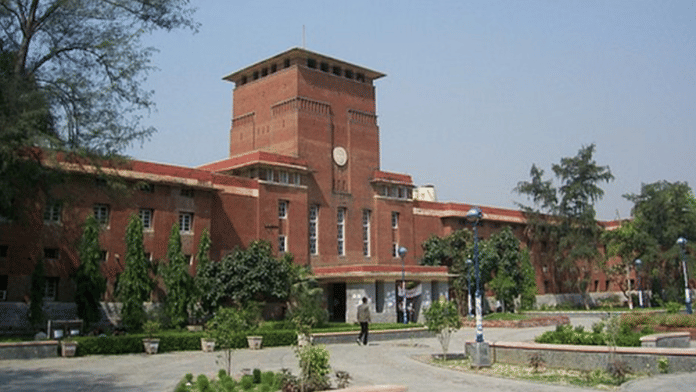New Delhi: The University of Delhi has cancelled at the last minute a seminar on land and property rights, scheduled for Friday at the Delhi School of Economics (DSE). Subsequently, Professor Nandini Sundar, a sociology faculty member at the DSE, has stepped down as convener of the seminar series.
While organisers said the university did not provide a reason for cancelling the event, Delhi University Registrar told ThePrint that “the department had not sought the required permission for the event”.
The seminar, titled ‘Land, Property, and Democratic Rights’ was part of the DSE Friday Colloquium series, organised by the Delhi School of Economics’ Department of Sociology, for decades.
Sharing the update on the cancellation, Sundar in a social media post said, “No reasons for the cancellation were given, in writing or otherwise, so we can only speculate that the RSS-led government is scared of any discussion around land and democratic rights.”
“Since I can no longer guarantee the intellectual integrity of the research colloquium and that it will not be cancelled arbitrarily at the last minute, I have resigned as convener of the colloquium,” Sundar, known for her work on tribal rights in Chhattisgarh, added.
When contacted, Delhi University Registrar Vikas Gupta said, “There is a process to be followed in every university, and in Delhi University, departments must seek permission from the administration and inform them about the event in advance. However, no such permission was sought for this lecture.”
He denied that the topic or the speaker was the reason for the event being cancelled.
The Delhi University Registrar said that university norms keep “changing” as per requirements and it is now a “notified protocol” that prior permission is required before organising any seminar or lecture.
“We don’t know what was happening earlier, but now the rules are clear—and they apply to all departments. The administration cancelled one event at the Sanskrit Department in June and another at the Political Science Department in August because they did not seek prior approval,” he said. “We have written to all departments multiple times about this rule,” he added.
However, Sundar said that the schedule was circulated at the beginning of the semester. “It’s not a one-off event for which we should seek permission. In any case, in which university does the admin decide speakers for every department seminar series? We have been running this for the last 60 years,” she told ThePrint.
Nandini Sundar is known for her book, The Burning Forest: India’s War in Bastar, which explores the conflict in Bastar, focussing on the state, Maoists, and lives of tribal communities.
In 2016, Sundar, along with JNU professor Archana Prasad and others, was accused by the Chhattisgarh police of involvement in the murder of a tribal man in Sukma. After an investigation, the police found no evidence linking them to the crime and gave them a clean chit.
In a statement, the Democratic Teachers’ Front (DTF)—a left-leaning teachers’ group at Delhi University—criticised the university’s decision, calling it evidence of a “stark contrast in administrative priorities”. The group said two recent communications from the university highlight “a conscious move away from scientific temper and academic integrity towards the promotion of an unscientific and regressive political agenda”.
The DTF said that while the Office of the Dean of Colleges recently circulated an invitation to a “National Godhan Summit”—organised by the Rashtriya Godhan Mahasangh, an organisation dedicated to cow welfare and cow-based sustainable innovations—the administration simultaneously cancelled a critical social science seminar.
“The active institutional promotion of this dubious event, juxtaposed with the suppression of a critical social science seminar, reveals a clear bias against scientific temper, which is a constitutional lodestar. It signals the DU administration’s commitment to furthering the unscientific and majoritarian agenda of the ruling RSS-BJP combine, which illogically prioritises belief-based claims over rigorously grounded, evidence-based science,” the statement said.
‘Totally undemocratic’
According to the event poster, Namita Wahi, Senior Fellow at the Centre for Policy Research, was scheduled to speak on the recent Supreme Court judgment in the context of the contentious history of the Fundamental Right to Property, highlighting the complex link between property, economic development, and democracy, and was scheduled to discuss how “the Supreme Court’s enforcement of the right to property may have helped protect democracy against authoritarianism without derailing the development agenda”.
Meanwhile, a department head at the university, requesting anonymity, told ThePrint, “It is not a seminar, it is a colloquium, and it has been happening every Friday for years. Earlier, we only needed permission for events involving foreign visitors. Now, they say departments must seek approval for any academic event, but many departments still do not. This is totally undemocratic.”
In her social media post, Sundar said that colloquium was part of the teaching practice and graduate students were required to attend. “It was a space for serious discussion where our students interacted with some very fine minds, and speakers came away impressed by the quality of our students. It was a good space for scholars to present ongoing work and get feedback. The university is obsessed with rankings even as it destroys all the spaces for people to engage with research.”
(Edited by Viny Mishra)






